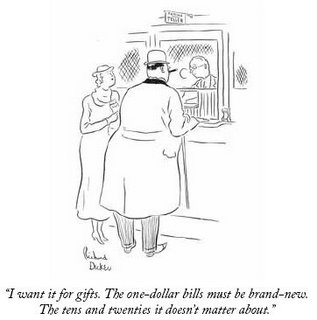
Artist : Richard Decker Publication : The New Yorker 26 Dec 1936
On December 17, 2006 for NYT, Peter Singer has written thought provoking "What Should a Billionaire Give – and What Should You?"
He says: “The Nobel Prize-winning economist and social scientist Herbert Simon estimated that “social capital” is responsible for at least 90 percent of what people earn in wealthy societies like those of the United States or northwestern Europe. By social capital Simon meant not only natural resources but, more important, the technology and organizational skills in the community, and the presence of good government. These are the foundation on which the rich can begin their work. “On moral grounds,” Simon added, “we could argue for a flat income tax of 90 percent.” Simon was not, of course, advocating so steep a rate of tax, for he was well aware of disincentive effects. But his estimate does undermine the argument that the rich are entitled to keep their wealth because it is all a result of their hard work. If Simon is right, that is true of at most 10 percent of it.”
Singer's Answer:
 In India and other similar countries, people like me who enjoyed huge public subsidies in higher education should remember this all the time.
In India and other similar countries, people like me who enjoyed huge public subsidies in higher education should remember this all the time.
No comments:
Post a Comment